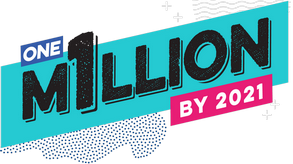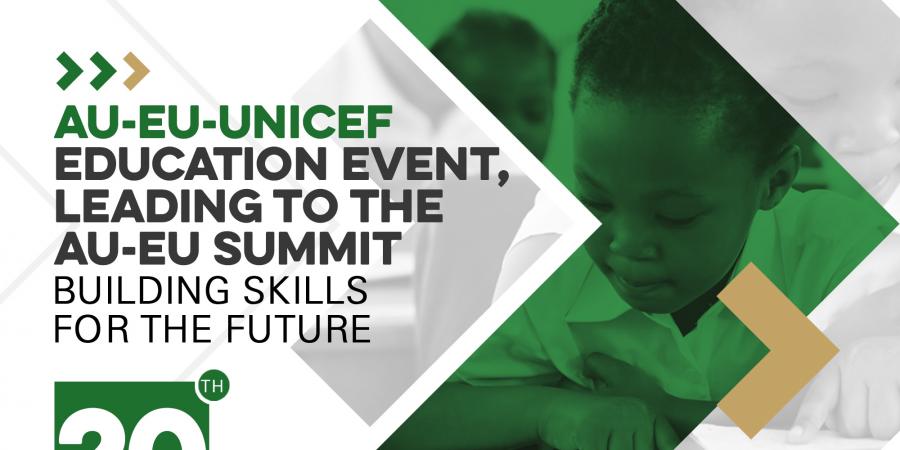On 20 April 2021, the African Union (AU) and European Union (EU), in collaboration with UNICEF, hosted a high-level event on education under the theme: “Building Skills for the Future".
The event's overall objective was to anchor education at the heart of the AU-EU strategy and the AU-EU-UNICEF trilateral partnership and to underline the importance of investing in the priority areas of:
- Access to quality education for all, at all levels
- Equity and inclusion (leaving no child behind), and teaching and learning of skills and competencies that respond to the needs of local economies and life in the 21st century.
The event marked a major milestone in recognizing education as a top priority of the AU-EU partnership and establishing common education priorities. It also highlighted the importance of bilateral and multilateral partnerships in achieving quality, inclusive and equitable education at all levels.
As a lead-up to the EU-AU summit, the participants at the event reaffirmed that:
- Amidst the severe impact of COVID-19, education will be at the heart of collective AU-EU efforts to sustain the implementation of Agenda 2063 towards an integrated and prosperous Africa, underpinned by the continental and global targets for education within CESA 16-25 and SDG4, and to ensure a sustainable, green, digital and just transformation.
- Joint actions will focus on strengthening education systems at all levels, from early childhood education to higher education and training, with particular attention to:
- Protecting the gains which Africa has made in addressing the learning crisis by urgently reopening educational institutions in a safe and supportive environment, leading to the improvement of learning outcomes, with teachers equipped to play an important role.
- Addressing inequalities in access and learning by identifying, promoting, and supporting the scale-up of innovations and good examples that safeguard and broaden access to education for girls, including ensuring gender-responsive school environments.
- Matching skills with jobs, by making sure young people have the right skills and are prepared for future labor market requirements through effective skills anticipation.
- Collective efforts will seek to harness the potential of digital learning and build digital competencies, while also bridging the digital divide.
- In order to achieve the goals of the CESA 16-25 and SDG4, adequate investment in education is critical. While recognizing fiscal pressure following COVID-19, protecting and increasing funding to education will be promoted. In this regard, the EU intends to raise funding for education to at least 10 percent of the International Partnerships portfolio. The AU recognizes the critical role of improving domestic revenue mobilization and equity of allocation and encourages the AU Member States to prioritize sustainable funding for their education systems.
- Building international partnerships will be critical to delivering on our collective agendas. The EU will work in a Team Europe spirit with its Member States to strengthen its partnership with Africa at bilateral, regional, and continental levels. The EU and AU intend to strengthen alliances with UNESCO, UNICEF civil society, private sector, the Global Partnership for Education, Education Cannot Wait, African Education, Science, Technology and Innovation Fund, and other relevant partners to build critical mass and drive collective efforts to ensure access to quality education for all.
Participants of the event included:
- H.E. Prof. Sarah Agbor, African Union Commissioner for Education, Science, Technology, and Innovation
- H.E. Jutta Urpilainen, European Commissioner for International Partnerships
- Ms. Henrietta H. Fore, Executive Director, UNICEF
- H.E. Josep Borrell, High Representative of the EU for Foreign Affairs and Security Policy
- H.E. Dubravka Šuica, Vice-President for Democracy and Demography, European Commission
- H.E. Janez Lenarčič, European Commissioner for Crisis Management
- H.E. Tiago Brandão Rodrigues, Minister of Education, Portugal
- H.E. Dr. Elioda Tumwesigye, Minister of Science, Technology, and Innovation, Uganda; Chair of the African Union Specialized Technical Committee on Education, Science and Technology
- Ms. Stefania Giannini, Assistant Director-General for Education, UNESCO
- Dr. Lynette Okengo, Executive Director of the Africa Early Childhood Network
- Ms. Heather Johnson, Vice-President Sustainability and Corporate Responsibility, ERICSSON
- Mr. Robert Jenkins, UNICEF Chief Education, and Associate Director
- Ms. Siatra Msandu, U-report Ambassador, Zimbabwe
- Mr. Olalekan Adeeko Ademola, AU 2020 Teacher Awardee, Nigeria



